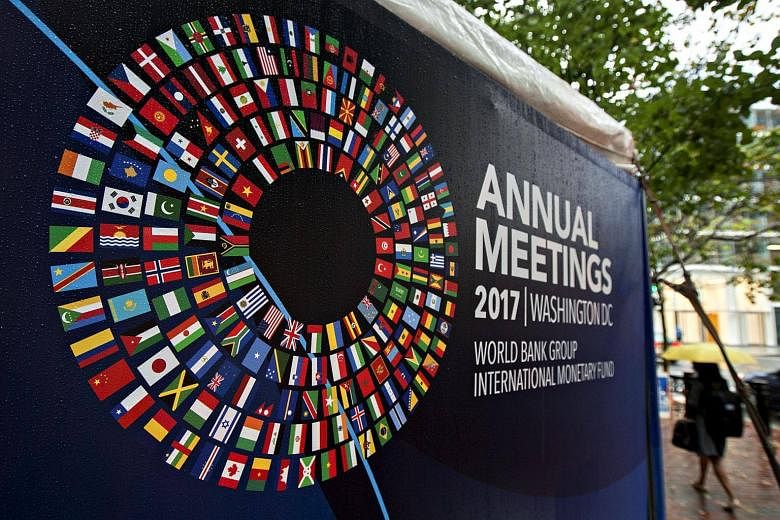WASHINGTON • The growing split between the United States and the rest of the world spilled into the annual meetings of the International Monetary Fund (IMF) and World Bank in Washington last week.
The US administration showed a diminished view of the Bretton Woods institutions that shaped a US-led order after World War II, rejecting efforts to expand their activities, and defending its attack on free trade pacts as part of President Donald Trump's "America First" agenda.
And at the same time, the US continued to stymie China's ambitions to elevate its global role via an expanded stake in both the IMF and World Bank.
The Trump administration spelt out its view by rejecting a capital increase that the World Bank wants to expand its global anti-poverty mission.
"More capital is not the solution when existing capital is not allocated effectively," US Treasury Secretary Steven Mnuchin said in a statement last Friday, one day after World Bank president Jim Yong Kim said he believed the Trump administration was now supportive of the move.
There was also no movement on the IMF's long-planned boost in its lending resources that would come with a shake-up of its shareholder quotas. Last year, the Republican-controlled Congress effectively vetoed the move, and the Trump administration has not supported bringing it back to life.
Instead, Mr Mnuchin took aim at the IMF and World Bank bureaucracies, calling them inefficient and suggesting their employees are overpaid - a longstanding view among many US conservative critics of both.
The new US stance on globalisation under the Trump administration also came through in the meeting of the G-20 finance ministers and central bank chiefs that took place during the IMF-World Bank meetings.
After presenting a tepid G-20 statement with no mention of trade or protectionism, German Finance Minister Wolfgang Schaeuble quipped that the G-20 lacks expertise in the matter. Because of that, he said, "at this time, global discussions are much more relaxed".
The US' differences with its allies were not evident on the surface, and the nearly week-long meetings of the two giant multilateral institutions went off smoothly.
Mr Kim and IMF chief Christine Lagarde kept the focus on the need for countries to reform for the long term while global growth is strong, and to address growing inequality, especially in the most developed nations.
IMF members gave lukewarm endorsement to a strengthening global economy but conceded they were not out of the woods as they grappled with subdued inflation, low potential growth and an uneven recovery that clouded the outlook.
They also renewed calls for fiscal policy and structural reforms to carry more of the burden in solidifying the recovery, now that the worst days of the economic storm had passed.
"Structural reforms that were difficult to do in hard times would be much easier in better times because the outlook is stronger," Ms Lagarde told reporters on Saturday.
"It's when the sun is shining that you need to fix the roof," she said.
But in statements to the steering committees of the two institutions, many countries made clear their differences with the US.
Most said they backed a capital hike for the World Bank. In its formal statement, China called the lack of progress on increasing World Bank capital "regrettable".
It is a crucial issue for Beijing, which sees that a larger shareholding in both the IMF and World Bank, both dominated by the US, would recognise its status as the world's No. 2 economy and a political superpower.
"We hope that all parties will provide more political impetus from the perspective of increasing the legitimacy and effectiveness of the World Bank's governance structure... so as to increase the representation and voice of emerging markets and developing countries," China said.
AGENCE FRANCE-PRESSE, REUTERS

